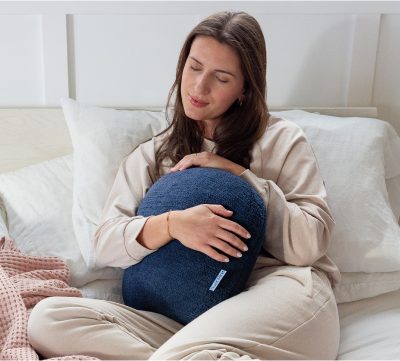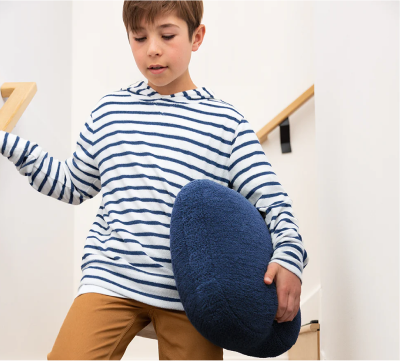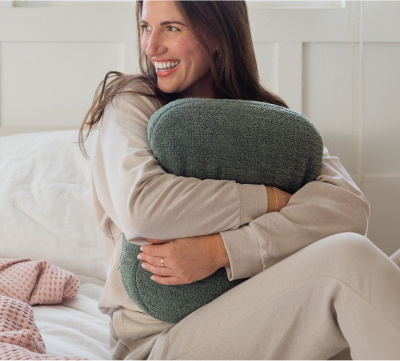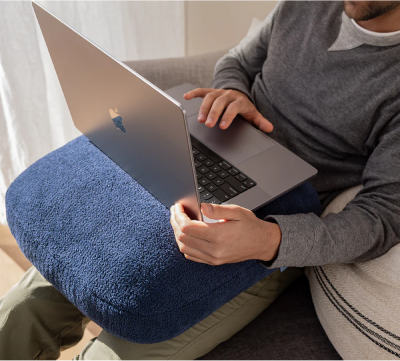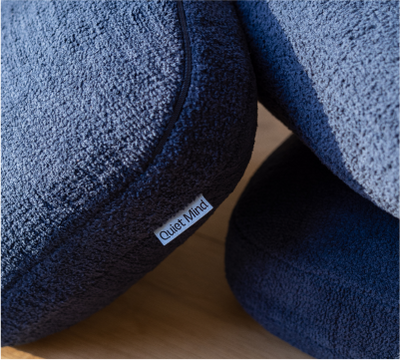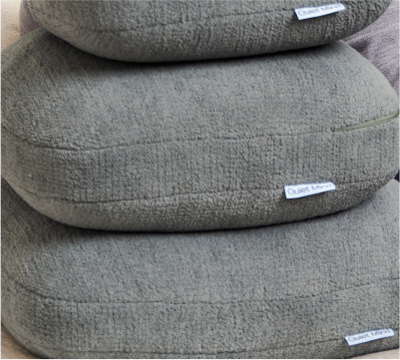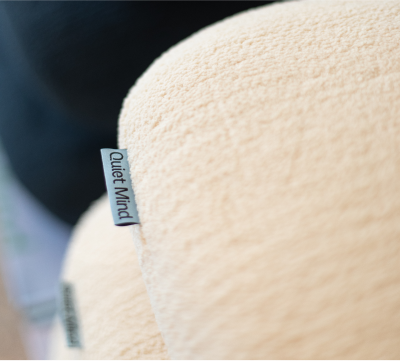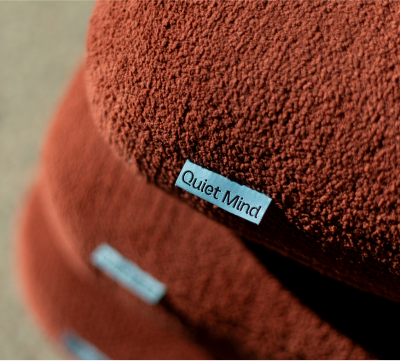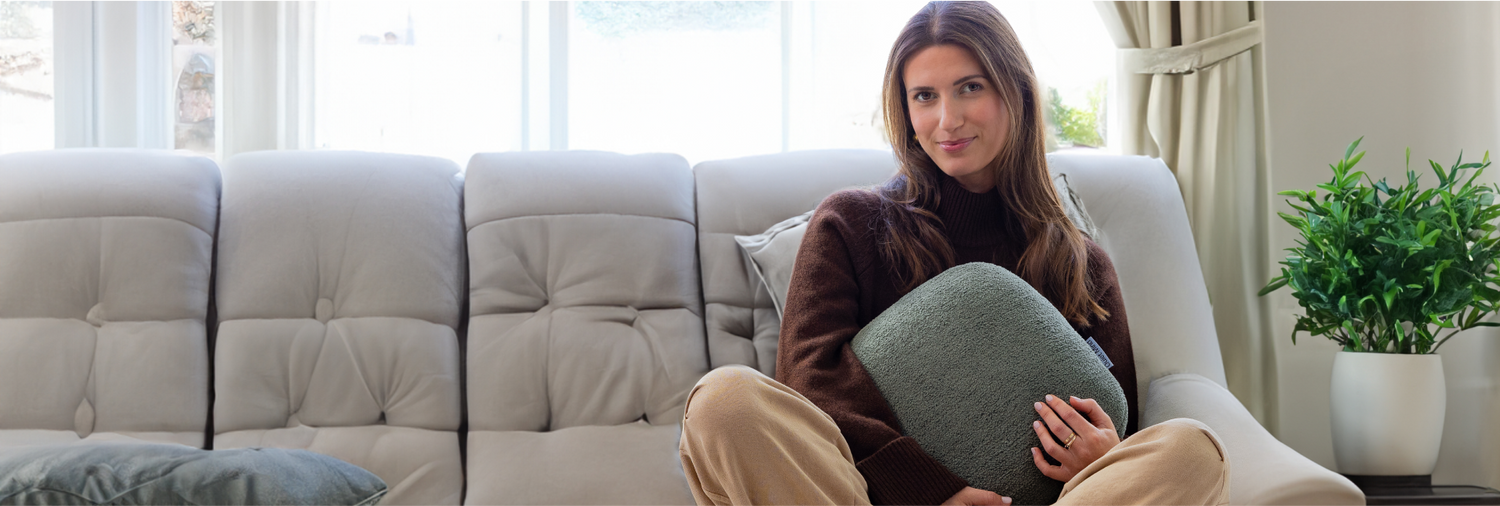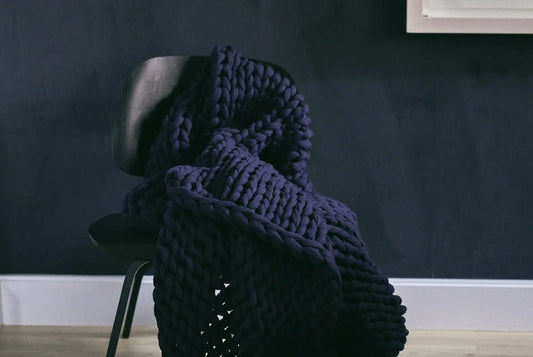You collapse into bed at the end of a long day, but instead of falling into a peaceful sleep, your chest feels tight, your thoughts race, and your breathing feels... off. You wake up groggy, maybe with a headache or a dry mouth, wondering: Is this just stress or something more?
Many people ask this exact question. And they’re right to. Because what seems like everyday stress might actually be interacting with a deeper sleep disorder, one that thrives in the quiet of night: sleep apnea.
In this article, we explore how stress causes sleep apnea and how one can mimic or worsen the other. Understanding this relationship can be the key to finally getting the rest you need.
What Is Sleep Apnea?
Sleep apnea is a serious sleep disorder where breathing repeatedly stops or becomes very shallow during sleep. These episodes are known as apneas and these can occur dozens or even hundreds of times a night. When this happens, your brain briefly wakes you up to resume breathing, often without you even realizing it.
Different types of sleep apnea:
- Obstructive Sleep Apnea (OSA): The most common type, caused by relaxed throat muscles that block airflow.
- Central Sleep Apnea (CSA): Less common, caused by the brain failing to send proper signals to the muscles that control breathing.
These episodes disrupt your sleep cycle and can lead to long-term complications if left untreated, including cardiovascular issues, mood disorders, and severe fatigue.
Obstructive vs. Central Sleep Apnea
There are two main forms of sleep apnea, each with different underlying causes:
Obstructive Sleep Apnea (OSA): The most common type, OSA is caused by a physical blockage of the upper airway. This typically occurs when throat muscles relax excessively during sleep, causing the airway to collapse. It’s often linked to weight gain, anatomy (such as a narrow airway or large tonsils), or sleeping position.
Central Sleep Apnea (CSA): Less common but equally serious, CSA is caused by a failure of the brain to send appropriate signals to the muscles that control breathing. Unlike OSA, there's no physical obstruction, rather it's a breakdown in the body’s communication system.
|
Feature |
Obstructive Sleep Apnea (OSA) |
Central Sleep Apnea (CSA) |
|
Cause |
Physical blockage of the upper airway |
Brain fails to send proper signals to breathing muscles |
|
Airway Obstruction |
Yes – due to relaxed throat muscles |
No – airway remains open, but breathing stops intermittently |
|
Common Triggers |
Excessive throat muscle relaxation, weight gain, narrow airway, large tonsils, sleep position |
Neurological issues, heart failure, or use of certain medications |
|
Prevalence |
Most common form of sleep apnea |
Less common |
|
Symptoms |
Loud snoring, gasping, choking during sleep |
Pauses in breathing without snoring, frequent awakenings, insomnia |
|
Associated Risks |
High blood pressure, daytime fatigue, heart disease, insulin resistance |
Irregular heartbeat, fatigue, heart failure risk, poor sleep quality |
|
Treatment Approaches |
CPAP therapy, lifestyle changes (weight loss, side sleeping), oral appliances, surgery |
Adaptive servo-ventilation (ASV), treating underlying neurological or cardiac conditions |
When either form goes untreated, the consequences can extend far beyond sleep, impacting memory, heart health, metabolism, and emotional regulation.
Common Signs of Sleep Apnea
Recognizing sleep apnea can be difficult because the most telling symptoms often occur while you're asleep. That said, there are key red flags to watch for:
- Loud, chronic snoring, especially if punctuated by gasping or choking sounds.
- Witnessed pauses in breathing by a partner or family member.
- Waking with a dry mouth, sore throat, or headache.
- Excessive daytime fatigue, even after a full night in bed.
- Trouble concentrating, irritability, or brain fog during the day.
These signs can overlap with symptoms of chronic stress or burnout. That’s why it’s so important to assess both sleep and mental health holistically, especially if the condition has gone untreated for months or years.
How Stress Affects the Body and Sleep
Stress is a biological alarm system designed to keep us safe from threats. When activated, whether by a looming deadline or a major life change, the body shifts into survival mode. Cortisol and adrenaline surge through the bloodstream, raising heart rate and sharpening alertness. This is known as the "fight-or-flight" response.
While this state is useful in emergencies, chronic stress keeps the body locked in a high-alert mode. And this has real consequences for sleep.
The Role of Cortisol and Nervous System Activation
Cortisol is often described as the body’s built-in alarm clock. It rises naturally in the morning to help us wake up but when stress is persistent, cortisol remains elevated even at night.
This leads to:
- Hyperarousal of the nervous system, which prevents the deep relaxation needed for sleep.
- Suppressed immune function, which can make recovery from illness or inflammation more difficult.
- Increased sensitivity to light, sound, and other stimuli, further fragmenting rest.
Over time, this dysregulation leaves the body in a constant state of alert. You may feel like you’re always on edge, tired but wired, and increasingly reactive; like your system just can’t handle stress anymore. And when this cycle repeats over days, weeks, or months, it doesn’t just affect mood or energy, it begins to alter respiratory patterns as well.
This is where the stress-sleep apnea connection becomes especially important to understand.
How Anxiety and Stress Disrupt Sleep
Stress and anxiety activate the body's alert system, making it harder to relax and stay asleep throughout the night.
- Racing thoughts and mental restlessness make it difficult to fall asleep.
- Heightened arousal may lead to frequent night waking.
- Increased heart rate and shallow breathing may reduce sleep quality.
Together, these disruptions can mimic or amplify sleep apnea symptoms even in those without a formal diagnosis.
Can Stress Cause or Worsen Sleep Apnea?
Stress alone may not directly cause sleep apnea. However, it can absolutely be a contributing or compounding factor, especially in people already at risk due to weight, anatomy, or family history.
Stress alters how we breathe, how we sleep, and how we process fatigue. Over time, this can exacerbate existing apnea or unmask symptoms in people who were previously unaware they had a sleep disorder.
What Science Says
Scientific research increasingly supports the connection between chronic stress and worsened sleep apnea symptoms. While stress may not be the root cause of the condition, studies suggest it plays a significant role in both its intensity and visibility.
A study found that people with untreated sleep apnea reported higher perceived stress and more nighttime arousals. This worsened fatigue and emotional health, suggesting that stress-driven disruptions in sleep structure can exacerbate breathing instability, even in undiagnosed individuals.
Stress as a Contributing or Complicating Factor
Stress doesn’t cause sleep apnea by physically blocking the airway. Instead, it disrupts the systems that maintain healthy breathing and sleep regulation. Chronic stress can:
- Alter nighttime breathing rhythms by dysregulating the autonomic nervous system.
- Increase systemic inflammation, which may heighten airway reactivity.
- Disrupt hormonal cycles, particularly cortisol and melatonin, affecting sleep stability.
- Encourage poor sleep hygiene, compounding sleep fragmentation and arousals.
While stress alone may not cause new-onset apnea, it can worsen symptoms in those with existing or undiagnosed sleep apnea, making episodes more frequent or harder to ignore.
Indirect Effects of Stress on Breathing During Sleep
Stress doesn't just affect your mood, it changes the way you breathe. These changes, while subtle, can contribute to more fragmented and shallow sleep.
- Elevated cortisol: High nighttime cortisol interferes with melatonin production and keeps the body in a state of readiness, preventing airway relaxation.
- Anxiety-driven hyperventilation: People with high anxiety may breathe rapidly and shallowly at night, increasing the risk of airway instability.
- Disrupted routines: Stress often derails healthy sleep habits, leading to irregular sleep schedules, screen overuse, and environmental factors that worsen sleep quality.
Using calming sensory tools like the Quiet Mind weighted pillow can help anchor your body during these moments, promoting deeper breathing and reducing nighttime stress responses.
Overlapping Symptoms: Stress vs. Sleep Apnea
Distinguishing between stress-induced sleep issues and apnea isn’t always straightforward. Both conditions can result in daytime fatigue, disrupted rest, and anxiety.
Differentiating Between Panic Attacks and Apnea Episodes
Though they can feel similar, panic attacks and sleep apnea episodes have distinct causes and patterns. Understanding the differences can help guide proper diagnosis and treatment.
|
Feature |
Panic Attack |
Apnea Episode |
|
Trigger |
Emotional or mental stress |
Airway obstruction or neurological cause |
|
Breathing |
Hyperventilation |
Pauses or shallow breathing |
|
Awareness |
Often occurs when awake |
Happens during sleep |
|
Accompanying symptoms |
Heart palpitations, dizziness, sweating |
Snoring, gasping, morning headaches |
Understanding these differences is key to choosing the right approach to recovery.
How to Identify the Root Cause of Sleep Disruptions
To determine whether stress, apnea, or both are contributing to your sleep problems, take a structured approach:
- Keep a sleep journal: Record your bedtime, wake times, symptoms, and any noticeable disruptions. Track patterns that emerge after high-stress days.
- Assess your stress levels: Use tools like the Perceived Stress Scale (PSS) or keep a daily mood log to understand when and how stress impacts your evenings.
- Seek a clinical evaluation: A sleep study (polysomnography) can measure breathing, brain waves, oxygen levels, and movement throughout the night. This provides clear data to help differentiate between insomnia, anxiety, and sleep disorders like apnea.
Shared Risk Factors: Where Stress and Sleep Apnea Overlap
Stress and sleep apnea don’t just intersect randomly they often stem from shared risk factors, both biological and environmental.
Medications That Affect Both Stress and Sleep
Certain medications prescribed for stress, anxiety, or depression may influence breathing or sleep architecture in ways that affect apnea severity:
- Antidepressants: May suppress REM sleep, affecting breathing cycles.
- Corticosteroids: Raise cortisol levels and disrupt circadian rhythm.
- Beta-blockers: Lower melatonin production, delaying sleep onset.
Always consult your doctor before adjusting any medication, especially if you’re dealing with a potential or confirmed sleep disorder.
Lifestyle and Health Factors That Compound Risk
Certain lifestyle and health conditions can worsen both sleep apnea and chronic stress, creating a reinforcing cycle that affects overall well-being.
|
Risk Factor |
Impact on Sleep Apnea |
Impact on Stress |
|
Weight gain |
Narrows airway |
Elevates cortisol |
|
Poor sleep hygiene |
Worsens apnea severity |
Inhibits stress recovery |
|
Mental health issues |
Heightens perception of symptoms |
Increases emotional sensitivity |
When these risk factors are ignored or left untreated, they can create a feedback loop where stress increases sleep disruption, which in turn raises stress further, amplifying the severity of both conditions.
Breaking the Cycle: Managing Stress to Improve Sleep
The path forward often begins with nervous system regulation. Small, steady practices can help reduce stress and shift the body from survival mode to rest-and-repair.
Breathing Techniques
Breathing techniques like box breathing and diaphragmatic breathing calm the nervous system, making it easier to fall asleep and manage stress.
- Box Breathing: Inhale for 4 counts, hold for 4, exhale for 4, hold for 4. This rhythmic practice helps reset the nervous system and anchors attention in the present moment.
- Diaphragmatic Breathing: Deep breathing from the belly (not the chest) signals safety to the brain and encourages parasympathetic activation, essential for sleep onset.
Regular breathing exercises not only improve sleep but can reduce anxiety throughout the day.
Cognitive Behavioral Therapy for Insomnia (CBT-I)
CBT-I is an evidence-based therapy designed to correct unhelpful thought patterns and behaviors around sleep. It can be especially effective for individuals struggling with both anxiety and sleep disorders.
Key techniques include:
- Stimulus control: Use the bed only for sleep, not for scrolling or working.
- Sleep restriction: Temporarily limiting time in bed to strengthen sleep efficiency.
- Cognitive reframing: Identifying and neutralizing anxious thoughts about sleep.
- Relaxation training: Using progressive muscle relaxation or guided meditation before bed.
For individuals with both stress and mild apnea symptoms, CBT-I can offer dual benefits, restoring more stable sleep while easing the grip of chronic tension.
Can Stress-Induced Sleep Apnea Resolve on Its Own?
In some cases, yes. Particularly when the sleep-disordered breathing is mild and triggered by short-term stress rather than structural or neurological causes.
Short-Term Stress and Breathing
Stress activates the sympathetic nervous system, leading to shallow or irregular breathing, especially during sleep. This can temporarily reduce airway stability, increase nighttime arousals, and mimic the symptoms of obstructive or central sleep apnea.
When stress is tied to a clear, time-limited event; such as a job loss, exam period, or acute grief. Symptoms may subside once the nervous system re-regulates and sleep architecture begins to normalize.
Practices that focus on relieving stress naturally, such as gentle movement (like yoga or stretching), deep breathing exercises, mindfulness, or guided relaxation before bed, can help restore healthy breathing rhythms.
Combined with good sleep hygiene and avoidance of alcohol or sedatives, these strategies can support full recovery.
Chronic Stress and Long-Term Breathing Disruption
However, long-term stress is more problematic. Persistent activation of the stress response can:
- Alter breathing rhythms and respiratory drive.
- Raise inflammation levels that narrow the airway.
- Disrupt hormonal cycles like melatonin and cortisol that support deep, restorative sleep.
Over time, these changes can condition the brain and body to maintain dysfunctional sleep patterns, even after the original stressor resolves.
In such cases, symptoms may evolve into clinically significant sleep apnea, requiring intervention.
When Sleep Apnea Causes Stress and Anxiety
The relationship between stress and sleep apnea is bidirectional. Stress can worsen sleep apnea symptoms, and untreated sleep apnea can fuel psychological stress, anxiety, and emotional burnout.
The Physiological Stress of Interrupted Breathing
Each time the airway collapses or breathing pauses during sleep, the brain responds by releasing adrenaline and other stress hormones to re-initiate breathing. These repeated micro-arousals:
- Spike heart rate and blood pressure.
- Prevent the brain from reaching deep, restorative sleep stages.
- Increase levels of cortisol and systemic inflammation.
Over time, this nightly cycle contributes to chronic stress, emotional reactivity, fatigue, and mental fog.
Emotional and Cognitive Toll
People living with undiagnosed or untreated sleep apnea often report:
- Irritability or low frustration tolerance.
- Difficulty concentrating or remembering information.
- Feelings of anxiety or emotional flatness.
It becomes harder to regulate emotions, cope with daily demands, or feel rested enough to manage existing mental health concerns.
Increased Risk of Mood Disorders
Numerous studies have shown that untreated sleep apnea significantly increases the risk of anxiety, depression, and even PTSD-like symptoms, especially in those who already experience high baseline stress.
The good news: treating sleep apnea can dramatically improve mental health. Whether through CPAP therapy, oral appliances, weight management, or nervous system-calming routines, better sleep quality often leads to better emotional resilience, sharper thinking, and a greater sense of inner stability.
When to Seek Professional Help
If you suspect that stress or a sleep disorder is interfering with your ability to function, don’t wait for it to get worse. The connection between poor sleep and chronic stress is more than just frustrating, it can become dangerous over time.
It’s also important to remember that stress can make you sick. It weakens your immune system, raises inflammation, and disrupts nearly every major biological system. When combined with untreated sleep apnea or chronic insomnia, the toll on your physical and mental health can be significant, fueling fatigue, emotional instability, cognitive decline, and even heart problems.
Diagnostic Tools
Healthcare providers may use a combination of tools to assess the full picture:
- Polysomnography (In-lab Sleep Study): Monitors brain waves, oxygen levels, heart rate, and breathing throughout the night. This is the gold standard for diagnosing complex or severe cases.
- Home Sleep Apnea Test (HSAT): A simpler, portable device for detecting moderate to severe sleep apnea in a home setting.
- Psychological Assessments: Validated questionnaires or interviews to evaluate levels of stress, anxiety, depression, or insomnia, which often co-occur with disordered sleep.
Treatment Options
Once a diagnosis is made, an individualized treatment plan can restore balance, not just in sleep, but in overall well-being.
|
Treatment |
About |
Benefit |
|
CPAP |
Continuous Positive Airway Pressure |
Keeps the airway open to prevent apnea episodes |
|
Lifestyle Changes |
Weight loss, exercise, stress reduction |
Targets underlying causes of both apnea and stress |
|
Therapy |
CBT-I, mindfulness, cognitive behavioral therapy |
Improves sleep, emotional regulation, and resilience |
These treatments are often most effective when combined for example, using CPAP for physical airway support while also engaging in stress management or therapy to calm the nervous system.
Final Thoughts on the Link Between Stress and Sleep Apnea
Stress and sleep apnea are deeply interconnected. One often feeds the other, creating a feedback loop that erodes quality of life. But this cycle isn’t permanent.
Whether your symptoms are caused by chronic stress, a sleep disorder, or both, there is a path forward. With consistent support through therapy, medical intervention, and daily practices that calm the nervous system, you can begin to reclaim your sleep and your peace of mind.
Don’t wait until exhaustion becomes your normal. The sooner you take action, the easier it becomes to break the cycle and build the foundation for true rest.
About Quiet Mind
At Quiet Mind, we design tools for people whose bodies stay alert long after the day is over. Our weighted pillows are made for moments when rest feels out of reach offering steady, grounding pressure that helps regulate breath, ease tension, and support better sleep.
For those living with disrupted nights whether from anxiety, a sleep disorder, or the lingering effects of stress, our pillows offer a simple, sensory way to shift the body out of fight-or-flight and into something softer.
Discover the calming support of our weighted pillows and take the first step toward deeper, more restorative sleep.
Frequently Asked Questions
Can stress cause sleep apnea?
Not directly, but it can exacerbate symptoms or mimic them, especially in those already at risk.
How does stress affect sleep quality?
Stress activates the nervous system and raises cortisol, making it harder to fall and stay asleep.
Can stress management help with sleep apnea?
Yes. While it isn’t a cure, reducing stress can ease symptoms and support overall sleep quality.
What are symptoms of sleep apnea?
Some of the major symptoms of sleep apnea include loud snoring, choking or gasping during sleep, fatigue, and poor focus during the day.
What treatments are available?
Sleep apnea treatment options include CPAP therapy, weight loss, CBT-I, and breathing techniques.
